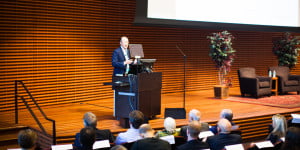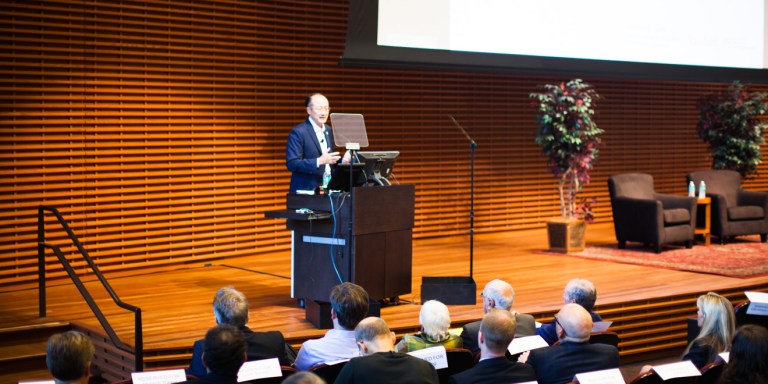
On Oct. 29, World Bank Group president Jim Yong Kim spoke at CEMEX Auditorium about health and global development.
The talk was part of a day-long conference on the prospects of promoting shared prosperity and health through innovation and institutions, hosted by the Stanford Global Development and Poverty Initiative at the Graduate School of Business.
In March 2012, when serving as president of Dartmouth College, Kim, an infectious disease physician by training, was nominated by President Barack Obama to lead the World Bank. Shortly afterward, following a tacit convention that the American nominee is always elected as World Bank president, Kim was officially chosen.
“If you ask me which was the more difficult — treating multi-drug resistant tuberculosis existent in the slums of Peru or [getting] faculties to work together across disciplines to solve problems — [it is a] very very close call,” Kim said in his opening remarks.
Kim emphasized the necessity of tackling such difficult tasks.
“Seeking transformative solutions to challenges of development and poverty that are necessarily cross-disciplinary is exactly what a great university should be doing,” he said.
According to Kim, the same applies to the World Bank. He explained that the challenge of eliminating extreme poverty worldwide is a responsibility of this generation.
“We have to reduce the proportion of people earning under $1.90 a day to less than 3 percent,” Kim said.
However, Kim noted that world poverty statistics are improving. In 1990, nearly 63 percent of the world population suffered from extreme poverty, which by that time’s standards meant earning less than $1 every day. In 2012, despite a huge 2.1 billion increase in world population, the number of people living in extreme poverty had gone down significantly to 12 percent.
“This year, for the first time in history, we expect that [the] extreme poverty rate globally will drop below 10 percent, around 9.6 percent — 700 million people,” Kim said. “This is the best news story in the world today.”
Kim also spoke about the negative economic implications of inequality, sexism and xenophobia. When he was 5 years old, Kim’s family immigrated from South Korea to the U.S., and in a recent Washington Post op-ed, he talked about the necessity of tackling the ongoing refugee crisis in Europe from the viewpoint of a “migrant.”
Responding to a question from The Daily after his talk, Kim explained how the World Bank would encourage countries to resolve discrimination and inequality. While in the past, the Bank has argued that issues like xenophobia, sexism and excessive inequality are wrong and should be addressed, it now has quantitive evidence that can be presented to its member countries on the issues’ negative economic effects.
“For all these things that we used to proclaim not based on evidence but only because we thought [they were] the right thing to do, it turns out that now we have the evidence to suggest that economically [they are] also the right thing to do,” Kim said. “Isn’t that great?”’
In 1994, Kim and other activists participated in a campaign focused on shutting down the World Bank at its 50th anniversary. They shared the belief that the Bank had not committed to solving global problems such as health care.
“Now I’m very glad that we lost that argument,” Kim said, noting that the World Bank has now made global health a priority.
“We’re now taking a much broader approach to development because we know that growth in GDP alone is not enough for us,” he added.
While pursuing an M.D. at Harvard Medical School in 1987, Kim co-founded Partners In Health, a non-governmental organization dedicated to providing humanitarian medical service to poverty-stricken countries. As leader of the World Bank, Kim acknowledged that he remains ambitious in realizing his goal of establishing a system that provides quality health care for the poor.
Kim explained the poor are “disproportionally” more likely to be affected by major pandemics such as Ebola.
“If you want to develop health systems that can do things for poor people’s heath that have never been done before, you’ve got to change, and if you want to change the system, setting an ambitious target is a great way to do it,” Kim said.
Contact Tom Cao at qitong ‘at’ stanford.edu.
